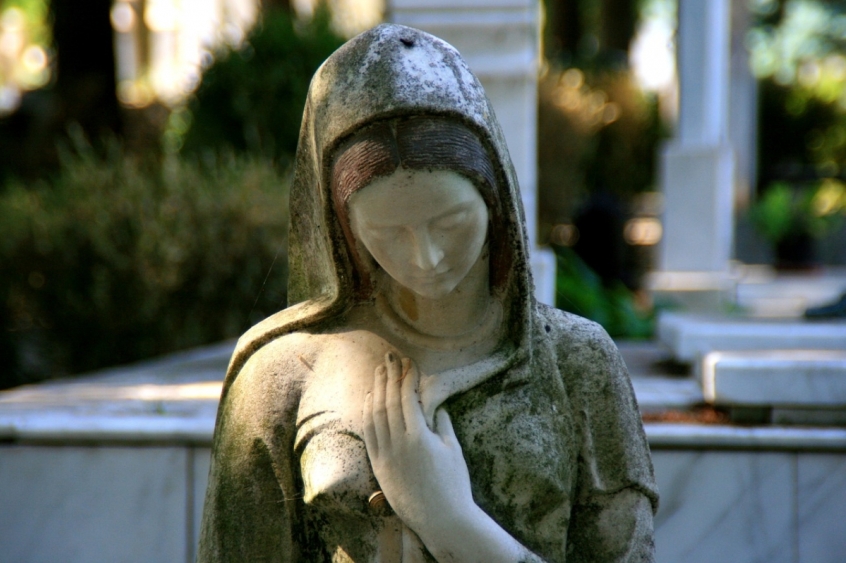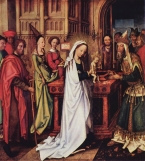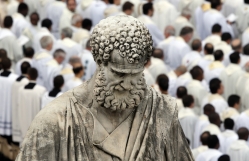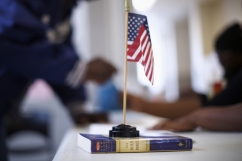
On September 8 I was strolling out of Westminster Cathedral having been to vespers. I was attending an event nearby and had decided to go into the mother church of the Catholic community of England and Wales. I hadn't realised that it was a Marian feast day, but sure enough, it was – the Cathedral was marking the Nativity of the Blessed Virgin Mary – the celebration of Mary's birth. This meant that the hymns, prayers and other aspects of the service had a flavour of Mary in all of them.
On the way out, I ran into a friend who's an Anglo-Catholic priest. "There's nothing like a Marian feast...", "Yes, marvelous, wasn't it?" he interrupted. I hadn't had the chance to finish my sentence. What I was going to say was, "There's nothing like a Marian feast to make one realise quite how Protestant one is!" We laughed as we walked away from the glorious Neo-Byzantine building.
The last few years have seen some remarkable moves towards unity between different branches of Christianity. Pope Francis has not only reached out to Lutherans on the eve of the 500<sup>th anniversary of the Reformation. He's also spoken warmly to Pentecostals in an almost unprecedented move.
The Archbishop of Canterbury has reached out to Eastern (and Oriental) Orthodox leaders, even as the strain shows between the political leaders of Russia, and the West.
In the USA, divisions between Protestant and Catholic which would have been considered unbridgeable a century ago now seem much less serious. Yes, there are still big differences on doctrine, but America no longer has to ask if a Catholic can run for president. It's just assumed that it's OK.
Today marks another of those Marian feasts. December 8 is marked as the Feast of the Immaculate Conception. Instead of going to Vespers, this evening I'll be at a Christmas meal followed by a choir practice for my own church.
Yet it's got me thinking. What is it about these celebrations that I find doesn't quite connect with me?
Having grown up in an independent evangelical church, the idea of celebrating any ancient practices seemed a bit alien. Slowly, over the years I've become more acquainted with the historic inheritance of the worship of the Western Church. Ancient practices of praying have become important, the lives of certain saints have become an inspiration, and I've developed a much more rounded view of scripture in relation to tradition and reason.
Having been confirmed as an Anglican when I was in my late 20s, I have explored the breadth of that tradition and what it has to offer. I'm pretty militant, when it comes to the Church calendar – observing Lent and Advent and making sure anyone within earshot knows it ain't Christmas 'til we've started Midnight Mass on December 24.
Today's feast is tricky, though. I'll admit I come with all sorts of Protestant biases, but I don't quite understand the celebration or even the importance of the doctrine of the Immaculate Conception.
The basic idea is that for Jesus to be perfect and sinless, Mary needed to be without original sin. As this helpful guide in the Telegraph puts it, "From as early as the sixth century, western and eastern Christian traditions celebrated the birth of Mary – daughter of Joachim and Anna, and mother of Jesus. Over time, the date settled at 8 September." Nine calendar months before that is, of course, today – when Mary was conceived, according to Catholic doctrine formalised in 1854 by Pope Pius IX, entirely free of original sin.
It was the fact that this belief was made mandatory for Roman Catholics that separated them from other Christians, rather than the belief itself. Indeed some Orthodox believers, along with Anglo-Catholics and even Lutherans (Luther himself considered Mary to be without sin) would be of similar mind to Roman Catholics on the Immaculate Conception.
In our current age of ecumenical friendship, I don't want to criticise this belief or those who cleave to it. There are parts of the world where this is a national holiday and a cause of fireworks and great celebrations. Mary is clearly one of the most important people in the Bible, indeed in all of history and Protestants have often gone too far in pushing her out of the picture.
Yet, the central Protestant critique of the doctrine of the Immaculate Conception remains. It isn't found anywhere within the Bible and was developed after the completion of the canon of Scripture. Jesus' divinity comes not from biological inheritance, it comes from His ontological status – in other words, Jesus is God because of who He is, not whether His mother was clear of original sin or not. There is also a risk of infinite regression with this doctrine. If we say Mary has to be immaculately conceived then what is to say her sinless perfection doesn't need to go back another generation, or indeed several more?
Celebrating and anticipating the incarnation of God himself at Christmas is the main aim of this season. Anything else is a sideshow for me. But, in the spirit of unity and fellowship shown by our leaders in recent years I say to other Christians who are celebrating today – I might be wrong – and I look to you helping me to understand futher.
Follow Andy Walton on Twitter @waltonandy

















